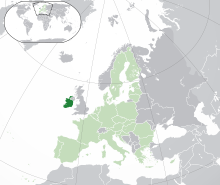LGBT rights in Ireland
| LGBT rights in Ireland | |
|---|---|

Location of Ireland (dark green)
– in Europe (light green & dark grey) |
|
| Same-sex sexual activity legal? | Legal since 1993, with an equal age of consent |
| Gender identity/expression | Yes, since 2015 |
| Military service | Allowed to serve openly |
| Discrimination protections | Sexual orientation protections (see below) |
| Family rights | |
| Recognition of relationships |
Same-sex marriage |
| Adoption | Yes |
– in Europe (light green & dark grey)
– in the European Union (light green) – [Legend]
Attitudes in Ireland towards lesbian, gay, bisexual, and transgender (LGBT) people are regarded as among the most liberal in the world. Ireland is notable for its transformation from a country holding overwhelmingly conservative attitudes toward LGBT issues to one holding overwhelmingly liberal ones in the space of a generation. In May 2015, Ireland became the first country to legalise same-sex marriage on a national level by popular vote. The New York Times hailed the victory as putting Ireland at the "vanguard of social change". Since July 2015, transgender people in Ireland can self-declare their gender for the purpose of updating passports, driving licences, obtaining new birth certificates, and getting married. Both male and female same-sex sexual activity is legal in the state. Government recognition of LGBT rights in Ireland has expanded greatly over the past two decades. Homosexuality was decriminalised in 1993, and most forms of discrimination based on sexual orientation are now outlawed. Ireland also forbids incitement to hatred based on sexual orientation.
In 2015 a survey of 1000 individuals in Ireland found that 78% of people are in support of same-sex marriage and 71% of people think that same-sex couples should be allowed to adopt. A 2013 survey showed that 73% of Irish people agreed that "same sex marriage should be allowed in the Constitution". Earlier, a 2008 survey showed that 84% of Irish people support civil marriage or civil partnerships for same-sex couples, with 58% supporting full marriage rights in registry offices. The number who believe same-sex couples should only be allowed to have civil partnerships fell from 33% to 26%. A March 2011 The Sunday Times poll showed support for full civil marriage rights at 73%.
In July 2010, the Oireachtas passed the Civil Partnership and Certain Rights and Obligations of Cohabitants Act 2010, recognising civil partnerships between same-sex couples. The Bill passed all stages in the lower house (Dáil), without the need for a vote, and by a margin of 48 votes to 4 in the upper house Seanad (Senate). The bill was supported by all parties, although individual politicians have criticised the legislation. Since the Civil Partnership legislation has been fully enacted and implemented from the start of 2011, gay and lesbian couples have been able to register their relationship before a registrar. The bill was signed by President Mary McAleese on 19 July 2010. The Minister for Justice signed the commencement order for the act on 23 December 2010. The law then came into force on 1 January 2011. Due to the three-month waiting period for all civil ceremonies in Ireland, it had been expected that the first Civil Partnership ceremonies would take place in April. However, the legislation does provide a mechanism for exemptions to be sought through the courts, and the first partnership, which was between two men, was registered on 7 February 2011. The first publicly celebrated Irish civil partnership under the Act took place in Dublin on 5 April 2011. On 6 April 2015, the Children and Family Relationships Bill 2015 was signed into law, amending (among other acts) the Adoption Act 2010, to enable same-sex couples to jointly adopt children and step-children.
...
Wikipedia
